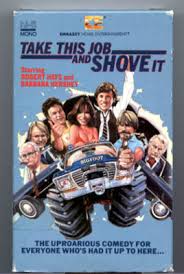
TAKE THIS JOB AND SHOVE IT
US, 1981, 95 minutes, Colour.
Robert Hays, Barbara Hershey, David Keith, Art Carney, Eddie Albert.
Directed by Gus Trikonis.
Take This Job and Shove It is a particularly American social comedy. It is based on a hit song by David Allan Coe, sung by Johnny Paycheck. The plot focuses on the confrontation between big business management and small local Mid-American? industry. It is particularly relevant to the social situations and recession of the late 170s?early 180s. It has a relevance for many industrialised countries throughout the world, and may indicate something of the atmosphere of recession in the early '80s. The film is directed by Gus Trikonis, whose early films were made for New World Pictures under the aegis of Roger Corman. He has a particularly talented cast for the film, including Robert Hayes (Flying High), Art Carney and Eddie Albert, Barbara Hershey as the heroine and David Keith (The Rose, Back Roads, Officer and a Gentleman). The film has a blend of the serious and the comic and is saying something, at a popular level, about capitalism, industry, the individual against the organisation.
1. An entertaining American comedy drama? The social focus? The persuasiveness and authenticity of the issues? Characters? Confrontation and resolution?
2. Colour photography, the contrast between the atmosphere of California and Dubuque, Iowa? Big business offices and local industry? The atmosphere of the small American city? The song from which the title comes, the musical score?
3. The title of the song and its confrontational tone? The skill of the screenplay in building a plot on the attitude of the song?
4. The credibility of the plot? The establishing of the West Coast style of big business? Corporate executives and their affluent symbols? The contrast with Middle America and its attempt to survive in economically difficult times? The young man returning to his home town and being confronted by his friends, girlfriend? The older generation in the town? Support for change, opposition? His having to face questions of integrity and loyalty?
5. Frank Maclin as hero? His Iowa background? The opening scenes establishing him as successful in his work? His being chosen to go back to Dubuque? The hold of the executives over him and the pressure on him to succeed? His return home ? part celebration, part showing off? His Mercedes, the girls following him, etc.? His upward mobility and his dedication to it?
6. The realities of the situation? The discussions with Charlie Pickett and the changing of the management of the brewery? His friendship with Harry and Ray? The challenge to his beliefs? The reminder of former days, friendships? His encounter with his girlfriend and the reminder of what had happened to them both? Their returning home and the possibility of starting again? The support from the corporation bosses?
7. The hostility in the brewery? Discussions with Pickett? The grumblings and the possibility of violence? The growing dilemmas for Frank? Advice from his friends? From his girlfriend? The pressures from the executives? His being forced to take stances? The deals, the arrangement with Pickett? Confrontations?
8. The sketch of J. M. Halstead and Barbara Hershey's style? Her background, leaving town, education, marriage, her return to her friends, the change, her attitude towards Frank? Falling in love? Clashes and support? The same experiences with Harry and Ray?
9. The atmosphere of the town, the decision to go against the corporate executives? Principle, friendships and loyalties? The business success and the threats of the failure of the brewery? Coming through?
10. The familiar theme of the small people against big corporate organisations? The emotional sympathies of the audience? A social parable for the early '80s?